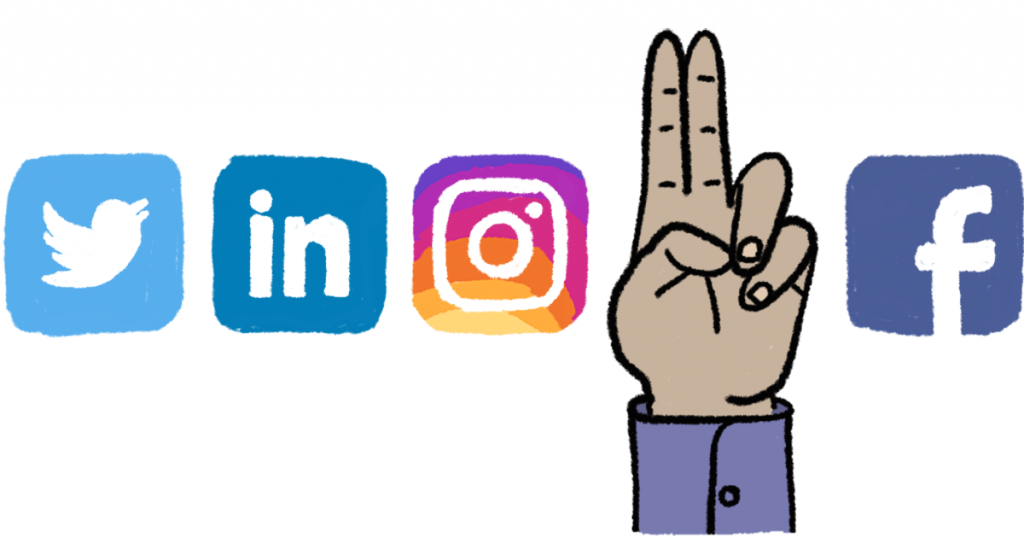A Code of Conduct for Social Media Use
TL;DR: Set personal rules for how you behave on social networks to make your experience more fruitful.

A year ago, I stopped using social media. I had many reasons for doing so. In retrospect, the main one was how it made me feel—and act. Stimuli overwhelmed me, I was judgemental, and I became overreactive. I blamed the networks for setting up this construct. Since then, I reflected on this. Over time, my perspective changed.
Networks like Facebook, Twitter, Linkedin, and Instagram use our shortcomings (e.g., fear, outrage, vanity) to manipulate us. But, this only works because of how we respond and behave. I figure this is like attending a house party that grows out-of-control—and taking no responsibility for the outcome.
I’m slowly wading into using some social media again. I still believe Mark and Jack ought to prioritize humans over growth (although it might be too late).1 I also recognize that the way I behave shapes my experience. “Niin metsä vastaa kuin sinne huudetaan.”2
The following are my personal3 guidelines for social media use. I’ll likely edit this list over time.
Only share information that is beneficial for others
Click-bait headlines4 aimed at gaming SEO for promotional purposes make the web worse. These practices are commonplace, but you needn’t follow this trend. Before posting anything on social media, ask whether it benefits the reader. If it doesn’t, avoid posting it. Like much in life, it’s not supposed to be about you.
Never take the bait
Trolls win when you respond to them. When you do, you give up control. Then, they’ll up the ante to suck you down further. The simplest approach is to ignore them. A bit of self-control on your behalf, now, will lead them to move on to easier prey. Remember that even though the attack might feel personal, this person doesn’t know you. For them, you’re just a means to an end.
Don’t name-call
In real life, you don’t walk up to strangers and call them out—even if they are out-of-line. (If you did, you’d soon appear to be the jerk.) Devices change how we view these engagements. A screen serves as a buffer that makes put-downs easier to hurl. Look upon insults like boomerangs made of poo. No matter where/how you hurl them, you always end up covered in shit.
Avoid social media pile-ons at all cost
The president will do something outrageous. A celebrity will fail to live up to our expectations. A person you don’t know will say something foolish. Many on social media will be there to condemn these people and dole out shame. Remember that few of us are free of wrongdoing. Meanwhile any of us could find ourselves on the receiving end of such a mob. These pile-ons afford you little other than a fleeting sense of virtue and self-importance.
Avoid bragging
Everyone wants to feel wanted. This want is corrosive. It makes us feel like our lives aren’t good enough. So, we use fakery, filters, and humble-brags to get some attention for ourselves. This leads others to do the same, perpetuating the cycle. Don’t talk about accomplishments. Don’t embellish the truth. And don’t use photos to show-off.
Remove expectations related to ego and self-benefit
Unless you are promoting a business (and even then you should think twice), avoid posting content for your own gain. Communication isn’t about you or what you need; it’s about the person you wish to communicate with. Don’t look upon social media as a way to benefit yourself; instead, treat it as a channel for connecting with others. Through it you offer help, lend support, and cheer them on.
Disregard follower counts
We like to keep score. That said, communication isn’t a contest. Moreover, you can buy likes, followers, and views. As such, they mean nothing. Concentrate on helping a few (or even one), instead of collecting notches. You might not even need to do so online. A meaningful phone call can do far more good than a bunch of automated tweets.
Never more than 15 minutes a day
Passive consumption is seductive. Newsfeeds lure us in. So does Reddit, YouTube, and (in the old days) flipping channels. Set a hard time limit for social media use. When it’s up, sign out of those networks and do some real work. (This is easier when you turn off notifications and uninstall mobile apps.)
Homework
Skim your past social media posts. Then ask yourself if this content represents who you are, and how you wish to interact with others. If it doesn’t, write—and abide by—your own code of conduct.
—
- I suspect growth is so entrenched in these companies that they can’t operate from any other standpoint. Therefore, wholly new networks might be better equipped to create more positive experiences that users migrate to.
- This is a Finnish proverb—and one of my favorites. It roughly translates to: The forest answers in the same way one shouts at it.
- Although this is a personal set of guidelines, I present it in the second person. This is because when I later reflect on these points I’ll read them as actions/commands, and not like a diary entry.
- Bonus tip: Avoiding hyperbole in article headlines and social media post content tends to minimize antagonistic responses. (The price of this tends to be lower traffic, though.)
I’m @karj and the above is just my opinion. Looking for more? Here’s a full list of articles and information on my books. This is what I’m doing now, and what I don’t do. I’d love it if you tried Emetti on your website!